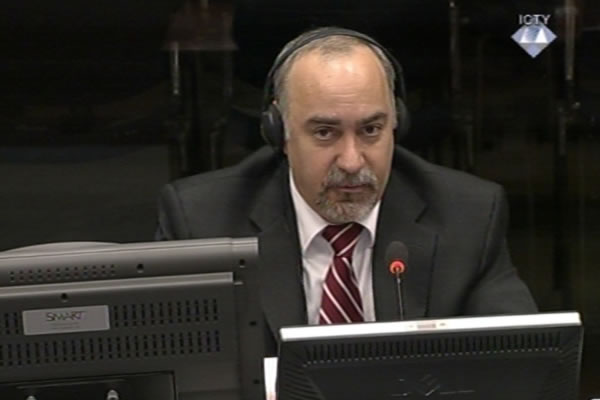Home
‘CARPET-BAGGERS’ WERE A LEGITIMATE MILITARY TARGET
Mladic’s defense implied that the Srebrenica civilians, known as the ‘carpet-baggers’, actually participated in combat when they entered and looted captured Serb villages and were thus a legitimate military target. The prosecution military expert begged to differ
 Richard Butler, witness at the Ratko Mladic trial
Richard Butler, witness at the Ratko Mladic trial On the last day of the cross-examination of prosecution military expert Richard Butler Ratko Mladic’s defense noted that the Srebrenica enclave hadn’t been demilitarized despite the agreement to that effect concluded by the warring sides and UNPROFOR. The witness never denied this in his examination-in-chief, and today he repeated that the BH Army’s 28th Division had never been fully disarmed. This made it a legitimate military target of the Bosnian Serb army, Butler explained. However, when defense counsel Dragan Ivetic claimed civilians were legitimate targets too, the witness disagreed.
The defense showed a document signed by Ramiz Becirovic, the BH Army Staff commander in Srebrenica. The document states that ‘each local community had its logistics and provided food for its troops’. As the defense counsel argued, this meant that civilians provided support to the fighters and participated in the hostilities, and were thus a legitimate military target. The witness didn’t deny that the people gave shelter and provided food for the soldiers. That, however, didn’t imply that the civilians were involved in the hostilities, Butler emphasized.
The same document states that civilians accompanied the troops as they attacked Serb villages, broke into houses and ‘took whatever they wanted’. According to the defense, this was conclusive evidence that they had taken part in the fighting. The American intelligence officer replied he knew that civilians would enter into villages where they mostly took food from abandoned houses. Butler ‘wouldn’t formulate this’ as fighting. Presiding judge Orie noted that looting of captured villages could be labeled as ‘undermining’ rather than helping the BH Army. The defense counsel replied that the issue called for a ‘more serious analysis’.
Becirovic’s document notes that the 28th Division soldiers handed over old and broken weapons in a bid to avoid complying with the demilitarization agreement. The good weapons remained hidden in the houses. The defense argued that this automatically turned the houses into legitimate military targets. Butler begged to differ. In Butler’s opinion, the fact that weapons or artillery pieces were hidden in a house didn’t make it a legitimate military target unless fire was opened from it. Butler used an example from Iraq to illustrate his point. The US troops there didn’t have the right to destroy houses where weapons were found in a search.
In a bid to justify Directive 7, signed by Radovan Karadzic in March 1995, which ordered the troops to create an ‘unbearable situation of total insecurity with no hope of further survival or life for the inhabitants of Srebrenica and Zepa’, the defense counsel put it to Butler that the quote was in fact an example of the ‘doctrine of dominant force’ which called for the use of a strong military force to disarm the enemy as soon as possible. According to the defense, the wording of Directive 7 was rather clumsy because it had been written by ‘lay persons’. The military expert reminded Ivetic that the document had been drafted by Radivoje Miletic, a general in the VRS Main Staff. Miletic surely wasn’t a lay person, Butler noted, adding that Karadzic – who signed the document – couldn’t be regarded as such either because by that time he had been the supreme commander of the armed forces for three years, although he had not had any formal military training.
As the hearing drew to a close, prosecutor McCloskey began re-examining the witness. The re-examination will be completed tomorrow morning.
Linked Reports
- Case : Mladic
- 2013-09-13 VRS DOCUMENTS CONFIRM AUTHENTICITY OF INTERCEPTED CONVERSATIONS
- 2013-09-12 TESTIMONY ABOUT MLADIC’S ‘SHOCKING AND OFFENSIVE’ COMMENTS
- 2013-09-11 MLADIC BACK IN COURT
- 2013-09-17 MILOVANOVIC AND MLADIC: TWO BODIES, ONE SOUL
- 2013-09-18 MILOVANOVIC: DIRECTIVE 7 WAS ILLEGAL
- 2013-09-19 KARADZIC’S DIRECTIVE 7 WAS ‘ILLEGAL’, MLADIC’S ‘LEGAL’
